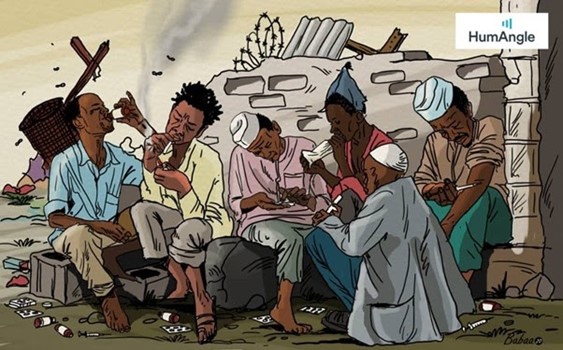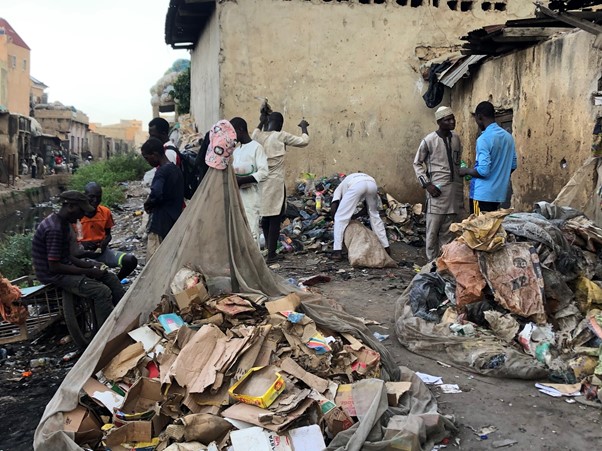Police Dislodge ‘Yan Sholi’ In Kano, But They Still Gather Elsewhere
After a report by HumAngle on the activities of young boys addicted to sniffing glue, police in Kano State, Northwest Nigeria raided their hideouts. But it is not over yet.

Police in Kano State, Northwest Nigeria have dislodged young boys who are addicted to sniffing a toxic and hazardous gas from glue.
The boys, locally known as yan sholi, sniff the hard substance released by the glue to get high. They were dislodged from one of their hideouts located at Kurmi market in Kano after a HumAngle report.
In January, HumAngle reported that a large number of under-aged boys and teenagers between the ages of seven and 15 in the commercial city of Kano were in the habit of sniffing glue used for patching bicycle tyres as a cheaper alternative to other hard drugs.
“Sholisho,” a local name for the addictive glue, serves as a cheaper gateway to taking other narcotics like marijuana and narcotics.
Health experts warn that the consumption of Sholisho can lead to acute respiratory failure. They also say it can lead to brain damage.
Abdullahi Kiyawa, Kano State Police Public Relations Officer, told HumAngle that the operation was aimed at cleansing the state of the drug addicts.
“The operation chases political thugs and other drug addicts and flushes them out of their hideouts,” Kiyawa said.
He added that about 40 of them were arrested by Police at Jakara Divisional Police Headquarters.
According to him, young boys among the arrested were handed over to their parents after passing through guidance and counselling.
“Sometimes we present them before juvenile courts if we find the case involves hard drugs,” he explained.
The boys include mostly school dropouts, children from broken homes, runaway Almajirai (young nomadic children sent to study Quran), scavengers, former street hawkers, among others.
A report has put Kano atop the list of states with the highest number of out-of-school children in Nigeria, with approximately 1.5 million boys and girls who have never been to or dropped out of school.
Despite free and compulsory basic education imposed by the state government, many of the boys who have chosen to hang out at those hideouts instead, are hard consumers at a younger age.

An Empty Hideout
During a recent visit to Kurmi market by our reporter, the Yan Sholi boys who usually mill around their hideout were no longer there.
A bicycle repairer working close to the hideout said the boys were recently flushed out of the place and dispersed to other locations as a result of repeated police raids.
However, according to him, they have moved to other locations in the porous market where they meet to buy and sell the glue among themselves.
“They have been forced out of this place but most of them have moved to somewhere else within the market,” said the bicycle repairer, who declined to be named for safety reasons.

During the visit, HumAngle encountered one of the boys who has now repented from taking the substance. He said he had successfully fought the addiction but noted that his former colleagues who escaped police arrests have continued meeting at the hideout in the early hours of the morning.
“You can come very early in the morning to see them yourself,” he said.
He said similar operations were done before but the boys always go back to their hideouts immediately they realise the police have gone.
Dan Sadin Ma’aiki, another bicycle repairer at the market told HumAngle that Yan Sholi are usually released even if arrested and they don’t pass through rehabilitation processes like other consumers of hard drugs.
“The aims of the operations are rarely achieved. These children are just moved from one place to another. They are not given any treatment or rehabilitation to fight the addiction,” he lamented.
Aminu Abubakar, who served as a fixer during the HumAngle report on Yan Sholi, disclosed his attempt to fight the addiction has not been successful. He went back to sniffing the glue after sometimes.
“It is very hard to quit. Even if you attempt it, you will just be tempted by it,” Abubakar lamented.
Many in the state argued that the government concentrates on abusers of hard drugs and gives little attention to the Yan Sholi who are mostly young boys.
Kano was recently pronounced as the third-highest state with the number of drug abusers in Nigeria.
In 2018, Mojisola Adeyeye, the Director-General of the National Agency for Foods, Drugs Administration and Control (NAFDAC) said about 70 per cent of youths in the state abuse illicit drugs but the number dropped in 2019.
Support Our Journalism
There are millions of ordinary people affected by conflict in Africa whose stories are missing in the mainstream media. HumAngle is determined to tell those challenging and under-reported stories, hoping that the people impacted by these conflicts will find the safety and security they deserve.
To ensure that we continue to provide public service coverage, we have a small favour to ask you. We want you to be part of our journalistic endeavour by contributing a token to us.
Your donation will further promote a robust, free, and independent media.
Donate HereStay Closer To The Stories That Matter




